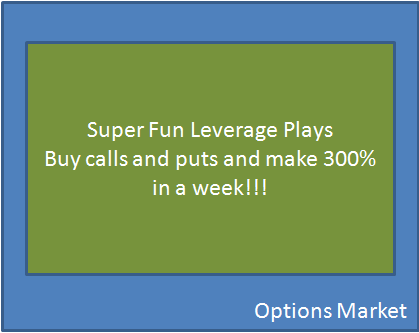 Welcome to the 6th lesson in your “Option Trading Basics Bootcamp.” Here we cover the most important trading rules new option traders should follow. By adhering to these option trading principles, you will become a more consistent, confident, and profitable options trader.
Welcome to the 6th lesson in your “Option Trading Basics Bootcamp.” Here we cover the most important trading rules new option traders should follow. By adhering to these option trading principles, you will become a more consistent, confident, and profitable options trader.
If you’re new to this series, check the past lessons at our Bootcamp Headquarters.
This week will be a discussion of the risks of options that many new option traders don't think about -- daytrading.
Principle #6: Don't Daytrade Options
Know the Market
When retail traders get involved with the options market, they are often attracted to the ability to leverage on positions to acheive 100%+ gains. They think the purpose of the options market is like this:
However, the options market isn't a speculative market-- it's a risk exchange. Firms use options as a way to transfer risk for a certain amount of premium. Sure, the super fun leveraged play is still there, but it's not the purpose of many of the market players. The options market really looks something like this:
When you are looking to leverage up in a trade, just respect the fact that you are a small fish in a big pond.
Getting Chopped Up
Large market players and market makers already put you at a disadvantage when swing trading directionally, but it becomes much more pronounced when attempting to daytrade options.
Liquidity will always be a huge concern. Unless you are trading the most liquid of names, there will be a wide bid/ask spread that you will have to navigate. And if you are continuously using market orders, you will underperform compared to if you were just trading stock.
In Play Stocks
If you are daytrading, quite often you want to be in the best markets with fresh news. These are often called "in play" stocks, as they will be super liquid and high frequency trading loses its bite because of the sharp increase in liquidity.
But in the options market, the liquidity may increase, but the bid/ask spread will widen even further as market makers declare a fast market.
This may seem unfair, but consider it from the MM perspective:
If someone goes out and buys puts, they will take the other side of that trade by selling puts, which leaves them delta positive. They then can go to the stock market and short shares against their position to get them delta neutral. However, if the stock has moved lower very quickly between that transaction, they will have too much slippage. So they will widen out the market so they have an advantage again in providing liquidity.
So daytrading options on "in play" stocks can be a dangerous task.
What's Your Goal?
 Assuming you fully understand the Greeks and how option positions will trade around them, then consider this question:
Assuming you fully understand the Greeks and how option positions will trade around them, then consider this question:
Why do you want to daytrade?
Essentially, the point of daytrading is to pull as many points out in a stock as quickly as possible while managing your risk.
In other words, you are looking to max out your delta (directional positioning) during a trade. To do that with options, you would have to incorporate deep in the money options, and those contracts have even less liquidity and wider bid/ask spreads.
Simply put, daytrading options can be a much more risky endeavor than you may expect.
The Exception
In this entire Option Trading Basics Bootcamp, there is often an exception to the rule.
These exceptions are valid once you better understand the options market.
When you trade options, it's not just about the direction of the underlying. It's also volatility risk, time risk, and the gamma risk.
Daytrading options will no longer be about maxing out your delta, but getting the best reward relative to all the risks.
You will have a whole new world open up to you, if you go beyond the basics of options and become much more knowledgable about options trading.
OptionFu, my online video course, will accomplish that for you. If you take the time to learn trading strategies and excecution tactics, you will have an edge over 80% of option traders out there. The course is quite comprehensive, covering many topics and going over 25 hours of high quality video-- you can learn more here.


